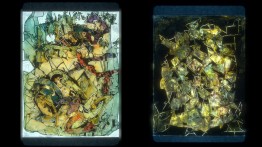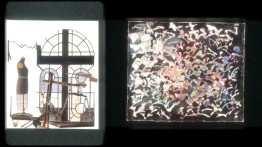Brian Swann Looks Back on His 50 Years at Cooper
POSTED ON: July 29, 2022
After a remarkable 50 years at The Cooper Union, Brian Swann, professor of English, retired this past spring from his full-time post as part of the Faculty of Humanities and Social Sciences. A passionate educator and prolific author, poet, and painter, Professor Swann has influenced generations of Cooper students and is especially known for his longstanding scholarship on, and advocacy for, Native American cultures and literatures.
Now, as he looks forward to teaching part-time this fall and devoting himself to the next writing project, Swann shares a few fond reflections and recollections on his five, storied decades at Cooper.
When I arrived at Cooper in 1972, I knew nothing about the place. After years at Princeton University, first as a Jane Eliza Procter Fellow from the University of Cambridge (two other fellowships were awarded to the University of Oxford and the École normale supérieure in Paris), then as lecturer, then assistant professor with a split appointment between the Creative Arts and English departments, I wanted a change from the vales of academe and, declining tenure, looked about for “something entirely different.” At an MLA meeting, scanning the jobs board, I found a place I’d never heard of but which was in Manhattan, where I kept a very small apartment in the Village. The '60s were still very much alive; it was all still happening, and I wanted to be part of it.
I was interviewed by the provost of Cooper, Leo Kaplan, who was also chair of Humanities, which he had ideas and plans for that eventually culminated years later with the hiring of our first dean, Michael Sundell. Thus began a golden age of our department, during which there was even talk of creating a Humanities major. Those plans were never realized, and Mike left to become director of Yaddo, the artists’ colony. Ever since I’ve been at Cooper, there have been plans for what is now the Faculty of Humanities and Social Science, but which has had many name-changes. The latest plans were set out by the Visiting Committee last semester. We’ll see what happens.
Cooper was a very different place in those days. Not only was the Engineering Building still standing in its clumsy glory, but the Hewitt Building stood empty and sinking into what had been the opposite of load-bearing sand. There was no residence hall at the time, and John Hejduk, who tried to entice me to leave Humanities and teach poetry for architects, had not yet begun his reconstruction of the Foundation Building. I even visited Green Camp, a wonderful place, about to be sold.
And the students? What attracted me was how different they were from Princeton students. The university had only recently become co-ed and was still what used to be dubbed “the northernmost southern university.” My own background was working-class. I was born in the ship-building, coal-mining town of Wallsend, near Newcastle in the North East of England. The first in my family to complete high school, let alone go to college, I attended Cambridge as a scholarship student. My Cooper students were often first-generation college students as well, working- or lower middle-class, and almost all from the tri-state area. I still keep in touch with a few. We did things unthinkable at Princeton. For instance, I took my creative writing students all over New York, including to the Coney Island aquarium, to write about what they saw. One class produced a play/review using work from their Creative Writing course, making and painting scenery, with music composed by an engineering student who later transferred to the Royal College of Music in London! The show, Your Mother, travelled to various colleges up and down the East Coast. Over the years, students from all three degree-granting schools have gone on to obtain M.F.A. degrees in poetry and fiction from e.g. Columbia University, the University of Arizona, Brooklyn College, City College of New York, and the University of Edinburgh, and to publish. Many more have woven their writing skills into their lives and careers.
I obtained grants from the National Endowment for the Arts (NEA) and New York State to bring in leading writers, such as Amiri Baraka and Allen Ginsberg, to teach courses. I recruited W.S. Merwin, winner of two Pulitzers in poetry, to join our faculty where he taught a course that he called “The Presence of Poetry” and which is now “The Poem Itself.” I persuaded my friend Leo Lionni to join us (Merwin and Lionni also delivered Commencement addresses). I established a free international reading series which The Village Voice called the best in New York and which included the distinguished Israeli poet Yehuda Amichai and N. Scott Momaday, the first Native American novelist to win a Pulitzer. Attendance at the readings was a required part of the first-year syllabus. Students were encouraged to bring their parents. All mingled with the readers afterwards over cakes and ale—well, not ale. I was part of a National Endowment for the Humanities and National Science Foundation grant to integrate humanities and engineering. Well, you get the idea. The place was hopping, almost literally when my wife, Roberta, director of the Great Hall, and music critic Gary Giddins co-founded the American Jazz Orchestra with the distinguished musician John Lewis as music director (it helped to recruit John that his sister, Marilyn Gore, was our then dean of students).
And now after five (or is it six?) Cooper presidents, a number of chairs and deans—including myself, who served as acting dean for a year after Mike Sundell left (at the same time I was in my fifth year as director of the Writing Workshops at Bennington College)—after all this and a lot of that, suddenly it’s time to retire. I will be teaching my “Personal Essay,” a favorite course which produces some wonderful work. And I will continue writing. My 14th poetry collection, “Imago,” will come out next spring from Johns Hopkins University Press, and the short fiction “Ya-honk! Goes the Wild Gander,” will be published by MadHat Press about the same time. I am well into another poetry collection. — Brian Swann








